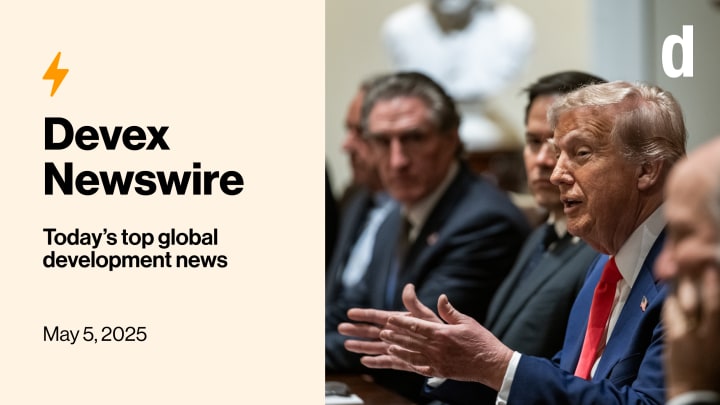
If budgets reflect values, then U.S. President Donald Trump’s “skinny budget” leaves little doubt about his administration’s regard for American development leadership.
Also in today’s edition: Kenya shares an ambitious plan for climate action, and a Devex reporter returns from parental leave with lots of questions — and a request.
This is a preview of Newswire
Sign up to this newsletter for an inside look at the biggest stories in global development, in your inbox daily.
Happening tomorrow: Join my colleagues David Ainsworth, Elissa Miolene, and Adva Saldinger to discuss the key themes from our reporting over the first 100 days of Trump’s presidency and the impact on the development sector, including an analysis of the proposed budget for fiscal year 2026. Register now to be a part of it. Can’t attend live? Register and submit your questions, and we’ll send you a recording!
The skinny
On Friday, the White House released a budget outline that would end U.S. foreign assistance as we know it.
The so-called skinny budget proposes a nearly 48% cut to foreign aid spending. In addition, the budget plan signals that the White House will try to rescind about $20 billion that Congress already appropriated. Taken together, the cuts and rescissions would add up to a roughly 84% reduction in U.S. foreign aid.
Adjusted for inflation, the proposal would bring the U.S. international affairs budget to its lowest level since World War II, and amount to less than Americans spend on Halloween supplies — both stats courtesy of the U.S. Global Leadership Coalition.
In its proposal, the White House repeatedly slams U.S. foreign aid programs for allegedly supporting “radical, leftist priorities” — while in the same breath proposing the creation of a $2.9 billion “America First Opportunity Fund” whose activities could include those “critical to keeping American safe, such as repatriations,” as well as funding for “critical partners.”
Aid budget experts tell my colleagues that the administration’s blueprint attempts to cherry-pick the few aid programs it deems tolerable — parts of the country’s flagship HIV program, PEPFAR, for example — in a way that is divorced from the reality of how they are implemented.
“That’s not how these programs work,” says Lisa Bos of InterAction. “This idea that you can pull out little pieces of the program … makes everything else completely ineffective.”
In addition to the proposed new America First fund — whose acronym would be “A1OF” — the budget proposes increased funding for the U.S. International Development Finance Corporation, while taking a slash-and-burn approach to everything else.
Some key figures:
• The White House wants to cut both global health and humanitarian assistance funds in half. Global health would see a $6.2 billion reduction.
• United Nations funding would drop by 87%.
• The White House wants to eliminate most of the accounts that currently fund long-term development — such as the Economic Support Fund and development assistance.
• The proposal includes $3.2 billion over three years for the World Bank’s International Development Association. That’s $800 million less than former President Joe Biden committed to IDA last December, but some had expected Trump to zero out IDA funding entirely.
• The State Department and USAID operations would see about $2.5 billion cut, as the administration moves forward with eliminating USAID and reducing staff.
Read: Trump budget proposes unprecedented, ‘reckless’ cuts to foreign aid
+ Explore our dedicated page for all the latest news, in-depth analysis, and exclusive insights on how the Trump administration’s policies are reshaping global development.
Yes we Kenya
For a different sort of plan, let’s look to Kenya, which on Friday released its nationally determined contribution, or NDC — the national climate change plan that all countries are required to submit ahead of this year’s United Nations Climate Change Conference in Brazil.
Kenya’s NDC is turning some heads, with some hoping it could be “a blueprint for other African nations balancing climate resilience with development priorities.”
It commits to 100% renewable electricity generation by 2035, greenhouse gas emissions reductions of 35%, and it takes a “whole-of-government” and “whole-of-society” approach. That means “integrating climate action into all areas of decision-making, from transportation to waste management to cooking and jobs,” according to my colleague Jesse Chase-Lubitz.
“It's a document from a nation where climate impacts are already measurable in GDP points lost annually,” says Nripanka Das, a sustainability and renewable energy expert.
Read: Kenya’s climate commitment sets standard before COP30
Play Bill
My colleague Ayenat Mersie is at the Philanthropy Asia Summit, where some 700 delegates have taken over Singapore’s iconic — and heavily air-conditioned — Marina Bay Sands to make waves on the global philanthropy stage. Among the big names on stage: Singapore’s President Tharman Shanmugaratnam and World Health Organization Director-General Tedros Adhanom Ghebreyesus.
But no one made a bigger splash than Bill Gates. Sharing the stage with Tharman in a conversation moderated by Jennifer Lewis of Temasek Trust, Gates offered rare public comments on U.S. aid cuts.
“The aid budgets, you know, in the U.S., the tentative proposal is that 80% cut and we’ll go to the Congress and try to convince them to not be nearly that dramatic,” Gates said, without offering further detail. Behind the scenes, Gates has reportedly been working hard to get time with anyone close to the president’s ear.
It’s not just the U.S. pulling back — European donors, long among the most generous, are also retreating. “We’re going to have a tough period here,” Gates acknowledged.
Still, he was quick to stress that this doesn’t spell doom. At the turn of the century, around 10 million children under 5 years old died each year — a figure Gates said we won’t be returning to.
“The only reason that the deaths won’t go back to 10 million is that we do have innovative tools. We have a pipeline of innovative tools,” he said, noting that many new lifesaving technologies over the past decades were developed in Asia. Gates also announced that his foundation would be opening an office in Singapore to better connect with researchers and philanthropists.
Related: As aid dwindles, can philanthropy rewrite the rules of giving? (Pro)
Lost and foundation
$8.3 billion
—That’s how much 20 U.S. foundations spent on development in 2022, according to a Devex analysis of figures from the Organisation for Economic Co-operation and Development. Unsurprisingly, the Gates Foundation was ahead of the others, with spending that would place it in the top 10 bilateral donors if it were a country. As nervousness that the current White House will mess with their long-standing tax arrangements rankles U.S. philanthropies, we take a look at their importance in the sector.
Read: How 20 US foundations spent more than $8 billion on development (Pro)
Further reading: How much did the largest foundations spend on development? (Pro)
+ A Devex Pro membership lets you access all our expert analyses, insider insights, funding data, exclusive events and career resources, and more. Not yet gone Pro? Start your 15-day free trial today. And check out all the exclusive content and events available to you.
A personal note
I’ve just returned from parental leave. After covering U.S. foreign aid agencies for more than a decade, it has been startling and disorienting to watch them systematically dismantled in the time it takes a newborn to learn to smile. I guess change happens slowly, then all at once. I have been so grateful and proud of the work my colleagues have done to shed light on this unprecedented chapter in American soft power. As I try to wrap my head around a reporting beat that has fundamentally changed during my time away, I find myself returning to a few questions:
• How did U.S. aid become such a prominent political target? Was there something about these specific programs that put them in the crosshairs, or was the attack on aid just a blueprint to be followed across the federal government?
• Why was the U.S. aid system so vulnerable to a hostile White House? How did the Department of Government Efficiency, aka DOGE, overpower the interest groups, institutional guardrails, congressional supporters, and advocacy networks that have sustained foreign assistance efforts for so long?
• How will the remaining U.S. aid programs function in a context of broken trust? Under the banner of “America First”? What will be born from the spaces U.S. aid used to occupy?
These are some of the things I’ll be thinking about at this time of endings and beginnings. But in the meantime, I have a more immediate request: Help me understand what I missed. If this seismic shift in America’s global role has affected you — and if you’re reading this, it probably has — I would like to hear what that has been like. What has changed for you? How did it unfold? What has it felt like?
If you’re willing to tell me about your experience of the last three months, you can reach me at michael.igoe@devex.com, or on WhatsApp/Signal at +1.202.770.6182.
And with that, back to work.
In other news
The Islamic Development Bank and the Asian Development Bank have each pledged $1 billion to co-finance joint development projects in their common member countries through 2030. [IsDB]
The Asian Development Bank announced Sunday that it will ramp up funding for nutrition and food security in the Asia Pacific region by $26 billion. [Dawn]
The Freedom Flotilla Coalition is in talks with Malta to allow its Gaza-bound aid ship, Conscience, to dock for repairs after it was damaged by two drone strikes near Maltese waters. [Al Jazeera]
Sign up to Newswire for an inside look at the biggest stories in global development.




